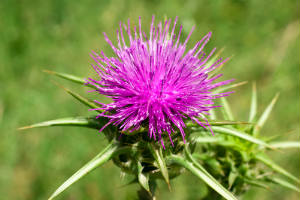Dr. Weeks’ Comment: The Chinese have a wise saying “Never lock the robber in your house” and that advice also applies to how to safely and effectively detoxify your liver. Detoxify first, then strengthen the cell membranes so that your liver can do its amazing work of keep your entire system running cleanly. Milk thistle seed is a champion of healthy livers and the optimal way to get the benefits of milk thistle seed is to eat the crushed whole organic non-GMO seed – not the extracted seed oil – eat the whole seed – husk and all!~
What are the Benefits of Milk Thistle Seed?
Milk thistle seed (Silybum marianum) has a history dating back over two thousand years as a favorite among herbalists for its positive effects on the liver and gallbladder. [1] The ancient philosophers Pliny and Galen both praised the herb for liver cleansing. Now, milk thistle is one of the most well-researched plants for liver support applications.
What is the Active Component of Milk Thistle Seed?
The seeds contain the highest concentrations of the active compound, silymarin. Silymarin is an antioxidant that reduces free radical production and oxidative damage. It may also inhibit the binding of toxins to the liver. In animals, silymarin reduces liver injury caused by acetaminophen and has been shown to have positive effects on alcoholic liver disease, hepatitis and toxin-induced liver problems. [2] [3] [4] It’s also very encouraging that milk thistle has a good safety record; side effects are rare and serious toxicity has not been reported, neither have drug interactions. [5] [6]
Liver Support Applications
With research that may open the door for more examples of traditional medicine to be successfully transposed into modern medical interventions, the Université of Montréal in Quebec assessed the protective potential of milk thistle extract in liver transplantation injury and concluded that silibinin shows promise in protecting the liver from certain damages. [7]
Milk thistle is native to the Mediterranean and the stems, also rich in antioxidants, are regularly eaten by those in the area to reduce oxidative damage in the liver and biliary tract. [8] Oxidative damage is thought to be one of the main mechanisms involved in nearly all chronic liver disorders. Overall, when investigating the value of herbal therapies for liver disorders, milk thistle is of high interest due to its high antioxidant capacity. [9]
Milk thistle seed has even been examined for a potential role in battling hepatitis C in Pakistan, where infection is a major problem. [10]
Other Actions of Milk Thistle
Interestingly, milk thistle seed has historically been given to people that ingested amanita, a toxic mushroom. It appears science agrees with this folk remedy, as researchers at the Institute of Complementary Medicine at University Hospital Zurich in Switzerland reviewed 65 papers on milk thistle trials and studies and, based on the available evidence, concluded it was reasonable to use silymarin for amanita toxicity. A review of all information also prompted them to encourage new research to explore new uses. [11]
Milk thistle has structural relation to compounds demonstrated active on liver metabolic processes, leading to speculation milk thistle reduces blood sugar. Further examination has in concluded the effects on liver glucose metabolism do have a blood sugar lowering effect. [12]
Milk thistle seed extract is known to have estrogenic effects and effects on memory by estrogen have been reported. Studies involving rats showed silybin administration during pregnancy resulted in positive brain changes and better memory. Could this lay the groundwork for further exploration of silybin and memory impairment diseases? [13]
References:
- Polyak SJ, Oberlies NH, Pécheur EI, Dahari H, Ferenci P, Pawlotsky JM. Silymarin for HCV infection. Antivir Ther. 2013;18(2):141-7. doi: 10.3851/IMP2402. Epub 2012 Sep 25.
- Abenavoli L, Capasso R, Milic N, Capasso F. Milk thistle in liver diseases: past, present, future. Phytother Res. 2010 Oct;24(10):1423-32. doi: 10.1002/ptr.3207. Review.
- Aghazadeh S, Amini R, Yazdanparast R, Ghaffari SH. Anti-apoptotic and anti-inflammatory effects of Silybum marianum in treatment of experimental steatohepatitis. Exp Toxicol Pathol. 2011 Sep;63(6):569-74. doi: 10.1016/j.etp.2010.04.009. Epub 2010 May 14.
- Kidd PM. Bioavailability and activity of phytosome complexes from botanical polyphenols: the silymarin, curcumin, green tea, and grape seed extracts. Altern Med Rev. 2009 Sep;14(3):226-46. Review.
- Saller R, Meier R, Brignoli R. The use of silymarin in the treatment of liver diseases. Drugs. 2001;61(14):2035-63. Review.
- Rainone F. Milk thistle. Am Fam Physician. 2005 Oct 1;72(7):1285-8. Review.
- Ligeret H, Brault A, Vallerand D, Haddad Y, Haddad PS. Antioxidant and mitochondrial protective effects of silibinin in cold preservation-warm reperfusion liver injury. J Ethnopharmacol. 2008 Feb 12;115(3):507-14. Epub 2007 Oct 24.
- Vaknin Y, Hadas R, Schafferman D, Murkhovsky L, Bashan N. The potential of milk thistle (Silybum marianum L.), an Israeli native, as a source of edible sprouts rich in antioxidants. Int J Food Sci Nutr. 2008 Jun;59(4):339-46.
- Wojcikowski K, Stevenson L, Leach D, Wohlmuth H, Gobe G. Antioxidant capacity of 55 medicinal herbs traditionally used to treat the urinary system: a comparison using a sequential three-solvent extraction process. J Altern Complement Med. 2007 Jan-Feb;13(1):103-9.
- Ashfaq UA, Javed T, Rehman S, Nawaz Z, Riazuddin S. Inhibition of HCV 3a core gene through Silymarin and its fractions. Virol J. 2011 Apr 1;8:153. doi: 10.1186/1743-422X-8-153.
- Saller R, Brignoli R, Melzer J, Meier R. An updated systematic review with meta-analysis for the clinical evidence of silymarin. Forsch Komplementmed. 2008 Feb;15(1):9-20. doi: 10.1159/000113648. Review.
- Colturato CP, Constantin RP, Maeda AS Jr, Constantin RP, Yamamoto NS, Bracht A, Ishii-Iwamoto EL, Constantin J. Metabolic effects of silibinin in the rat liver. Chem Biol Interact. 2012 Jan 25;195(2):119-32. doi: 10.1016/j.cbi.2011.11.006. Epub 2011 Nov 25.
- Yaghmaei P, Parivar K, Masoudi A, Darab M, Amini E. The effect of silybin on passive avoidance learning and pathological changes in hippocampal CA1 and DG regions in male Wistar rats offspring. J Asian Nat Prod Res. 2009 Jun;11(6):514-22. doi: 10.1080/10286020902927864.


